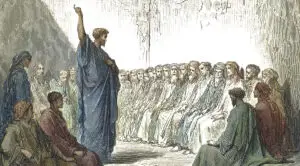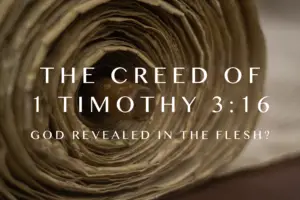An Examination of Acts 20:28
When Paul was en route to Jerusalem, he stopped in the city of Miletus long enough to call for the elders in neighboring Ephesus to come to him that he might exhort them to be on guard against savage wolves:
Acts 20:28-30 (NASB) “Be on guard for yourselves and for all the flock, among which the Holy Spirit has made you overseers, to shepherd the church of God which He purchased with His own blood. 29 “I know that after my departure savage wolves will come in among you, not sparing the flock; 30 and from among your own selves men will arise, speaking perverse things, to draw away the disciples after them. (emphasis added)
Paul’s exhortation includes a statement which some Trinitarians use to “prove” Jesus is God. They claim that without ambiguity, Paul identifies Jesus, the one who shed his blood, as God in verse 28. To them, it is an open and shut case. But is it? Does the context of Acts 20 support this reading? What about the letter Paul subsequently wrote to the church in Ephesus? Does it echo this belief? What about the Greek text? Is it as unambiguous as the English translation appears to be? In this post, we will answer all of these questions.

Context
To properly understand any biblical passage it must be viewed in its textual, historical and cultural context. To that end, we read in Acts chapters 18 and 19 that Paul visited Ephesus briefly at the end of his second missionary journey,[1] and then again during his third missionary journey,[2] when he lived there for two years.[3] Nowhere does Acts indicate that Paul taught on the divinity of Christ or the doctrine of the Trinity during these visits. We then read in chapter 20 that when Paul was en route to Jerusalem, he stopped in Miletus and called for the elders of the church in Ephesus to come to him. Here, Paul summarizes what he had taught during the course of his prior ministry to them:
Acts 20:18-21 (NASB) And when they had come to him, he said to them, “You yourselves know, from the first day that I set foot in Asia, how I was with you the whole time, 19 serving the Lord with all humility and with tears and with trials which came upon me through the plots of the Jews; 20 how I did not shrink from declaring to you anything that was profitable, and teaching you publicly and from house to house, 21 solemnly testifying to both Jews and Greeks of repentance toward God and faith in our Lord Jesus Christ.
It is important to note that Paul says he taught them everything that would have been profitable to them, summarizing his teaching by emphasizing that God is calling for all men to repent, and the necessity of faith in Jesus who is Lord and Christ. Paul places God in one category and Jesus in a separate category. One is deity, the other is the promised Messiah. If Paul had viewed the doctrine of the Trinity and the deity of Christ as profitable doctrines he would have taught them. In other words, the book of Acts never records Paul teaching the Ephesians doctrines that post-Biblical Church councils and modern orthodoxy insist are necessary for salvation.
Some may counter, nevertheless, that Paul could have taught such doctrines even though it is not recorded in Acts, offering that perhaps it is recorded in his subsequent letter to the Ephesians. Let’s take a moment, therefore, to look at who Paul says God and Jesus are in this important epistle.

Reading the letter to the Ephesians, it does not take us long to discover that Paul believes God is the Father while Jesus is the Christ. The apostle makes a clear distinction in the opening passage:
Ephesians 1:3-4 and 15-17 (NASB) Blessed be the God and Father of our Lord Jesus Christ, who has blessed us with every spiritual blessing in the heavenly places in Christ, 4 just as He chose us in Him before the foundation of the world, that we would be holy and blameless before Him…15 For this reason I too, having heard of the faith in the Lord Jesus which exists among you and your love for all the saints, 16 do not cease giving thanks for you, while making mention of you in my prayers; 17 that the God of our Lord Jesus Christ, the Father of glory, may give to you a spirit of wisdom and of revelation in the knowledge of Him. (emphasis added)
Not only does Paul not categorize Jesus as God, but he also declares that Jesus has a God! This makes no sense if Jesus is God because God cannot have a God. However, if Jesus is the human Christ of God, it makes complete sense. To be sure, these truths are confirmed throughout the remainder of the letter.[4]
Translations
If Jesus is not God, how then could Paul write that God purchased the Church with His own blood?
Acts 20:28 (NASB) “Be on guard for yourselves and for all the flock, among which the Holy Spirit has made you overseers, to shepherd the church of God which He purchased with His own blood.
Unfortunately, there are a handful of verses in Scripture that have been rendered by translators in a way that favors a Trinitarian interpretation.[5] Such bias is seen in the above passage in translations like the NASB, ESV, KJV, and the NKJV. But even these translations note that there is another way to translate the passage. For example
English Standard Version footnote on Acts 20:28 says: Or with the blood of his Own[6] (emphasis added)
New International Version footnote on Acts 20:28 says: Or with the blood of his own Son[7] (emphasis added)
The NASB Study Bible notes that the phrase his own blood is literally “the blood of his own one,” and is “a term of endearment (such as ‘his own dear one’) referring to His own Son.”[8] In other words, the literal interpretation, as also seen in the Greek interlinear,[9] is one that supports the idea that God, through His plan of redemption, purchased the Church with the blood of His dear Son, Jesus. Indeed, this is the way numerous Bible translations have rendered the passage, with the blood referring, not to God, but to God’s own Son:[10]

New English Translation (2005) – Watch out for yourselves and for all the flock of which the Holy Spirit has made you overseers, to shepherd the church of God that he obtained with the blood of his own Son. (emphasis added)
New Revised Standard Version (1989) – Keep watch over yourselves and over all the flock, of which the Holy Spirit has made you overseers, to shepherd the church of God that he obtained with the blood of his own Son. (emphasis added)
Common English Bible (2011) – Watch yourselves and the whole flock, in which the Holy Spirit has placed you as supervisors, to shepherd God’s church, which he obtained with the death of his own Son. (emphasis added)
Revised Standard Version (1946) –Take heed to yourselves and to all the flock, in which the Holy Spirit has made you overseers, to care for the church of God which he obtained with the blood of his own Son. (emphasis added)
Complete Jewish Bible (1998) – Watch out for yourselves, and for all the flock in which the Ruach HaKodesh has placed you as leaders, to shepherd God’s Messianic community, which he won for himself at the cost of his own Son’s blood. (emphasis added)
Contemporary English Version (1995) – Look after yourselves and everyone the Holy Spirit has placed in your care. Be like shepherds to God’s church. It is the flock that he bought with the blood of his own Son. (emphasis added)
Revised English Version (2013) – Pay attention to yourselves, and to all the flock in which the Holy Spirit has made you overseers, to feed the congregation of the Lord that he purchased with the blood of his own son.
Expanded Bible (2011) – Be careful for [Keep watch over] yourselves and for all the people [L flock] the Holy Spirit has given to you to oversee [L made you overseers/guardians; John 21:16]. You must be like shepherds to the church of God, which he bought [or obtained] with the death of his own Son [Lwith the blood of his own (Son); or with his own blood]. (emphasis added)
Darby (1939) – Take heed therefore to yourselves, and to all the flock, wherein the Holy Spirit has set you as overseers, to shepherd the assembly of God, which he has purchased with the blood of his own. (emphasis added)
What’s more, “Both the American Bible Society and the Institute For New Testament Research in Germany (which produces the Nestle-Aland Greek text) agree that the manuscript evidence supports the reading tou haimatios tou idiou, literally, the blood of His own (Son), and not idiou haimatios, “his own blood.” God paid for our salvation with the blood of His own Son, Jesus Christ.”[11]
Nowhere else in Scripture are we told that God died, nor does it speak of God’s blood. On the contrary, we are told that God is immortal, which, by definition, means He cannot die.[12] Other passages affirm that it was the blood of Jesus, the lamb of God (not God the lamb),[13] that purchased men for God, not as God:
Revelation 5:9 (NASB) And they *sang a new song, saying, “Worthy are You to take the book and to break its seals; for You were slain, and purchased for God with Your blood men from every tribe and tongue and people and nation. (emphasis added)
Hebrews 9:14 (NASB) how much more will the blood of Christ, who through the eternal Spirit offered Himself without blemish to God, cleanse your conscience from dead works to serve the living God? (emphasis added)
When we take inventory of all that Paul taught the Ephesians, that God is both the Father and the God of Jesus, and that he withheld nothing of value from believers, yet he never taught on the doctrine of the Trinity or the deity of Christ, the literal translation of Acts 20:28 makes more sense and is in keeping with the rest of Scripture. Did God purchase the Church with His own blood? No, but His human messiah did!
[1] Acts 18:18-21.
[2] Acts 19:1-41
[3] Acts 19:8-9.
[4] For example, Ephesians 1:20-22; 4:4-6; 5:5; 6:23.
[5] For example, John 1:1-3, John 1:15, 30; Titus 2:13, etc.
[6] Acts 20:28, English Revised Version, (Wheaton, IL: Crossway, 2002), p. 930.
[7] Acts 20:28, New International Version, https://biblehub.com/niv/acts/20.htm
[8] Acts 20:28 New American Standard Bible Study Bible, (Grand Rapids, MI: Zondervan, 1999), p. 1615.
[9] https://biblehub.com/interlinear/acts/20-28.htm
[10] Others include the Good News Translation (1992), Lexham English Bible (2010), Mounce Reverse-Interlinear New Testament (2011), New Century Version (2005), The Voice Bible Translation (2011), etc.
[11] https://www.biblicalunitarian.com/verses/acts-20-28b
[12] 1 Timothy 6:16.
[13] John 1:19 and 36.




actually i don’t understand why people get hung up on this verse, first of all who bled? God cannot bleed, so it absolutely has to be the human Yeshua.
so Yeshua with his blood purchased the church of who? Well of God he actually purchased something with his blood, but if purchased it, it did not own it. Point is he purchased the church of God, so God’s church is not his it is God’s. so what did he purchase with his blood? All of us, the body of christ, he purchased it by clearing our sins and thus to give us access to God’s spirit through him. But the church of God is not Yeshua’s he owns the body which is God’s house his temple, but where will we live? we will live in heaven this our habitation for our flesh and bone bodies, this i why Yeshua prays
John 17:11 And I am no more in the world, but these are in the world, and I come to You. set-apart (Holy) Father, guard them in Your Name which You have given Me, so that they might be one, as We are. (Literal ver) and also
John 17:22 And the glory which You gave Me I have given them, so that they might be one as We are one, (Literal ver)
so no he did not purchase the church of God by being God, but by his blood something God could not give, only a human being could.
Thanks for commenting, JP! Your conclusions are very logical. Unfortunately, tradition and cognitive biases keep many from seeing the truth.
God bless,
OGW
I go with NASB, ESV, KJV, and the NKJV. If Jesus is the SON of God, I find it difficult to believe who else he should be in form and content other than God! The best way to pull down the DIVINITY of Christ is to first pull down his SONSHIP. How would you say my son is not a human? The father is not Christ and Christ is not the father but both personalities are God. Was Christ Created or Born?
Chuks,
Thank you for your comment. I am glad to hear that you think the NASB and ESV translations are accurate because, as you may recall from the article, both translations agree that the passage could be rendered “with the blood of his own” or the “blood of his own Son.” Thus, the passage is not a sound proof text for the deity of Christ. As I summarized in the article, “…the literal interpretation, as also seen in the Greek interlinear, is one that supports the idea that God, through His plan of redemption, purchased the Church with the blood of His dear Son, Jesus. Indeed, this is the way numerous Bible translations have rendered the passage, with the blood referring, not to God, but to God’s own Son.”
As for Jesus being the Son of God, your inference that the title must mean Jesus is God if he is the Son of God ,reveals that you are not familiar with the way the Bible uses the title. With regard to Jesus, the title was a messianic one, synonymous with Messiah, Christ, and King of Israel, and is reflective of his role. Son of God is never used in an ontological sense to denote Jesus’ nature. You can learn more about how Son of God is used in Scripture in this article: Son of God: Proof of Jesus’ Deity?
God bless,
OGW
But God did purchase the church with His Own blood because although Jesus was man Jesus was also God_ for Jesus was both God and man. In fact many times the Jews try to kill Him because He proclaimed to be God, and ultimately this is what caused the Jews to sentence Him to death. Jesus said I AM. And that title only belongs to God. And God says that He will not give His Glory to another, He alone is God, He alone is the Savior, and there is none besides Him. you can find it in the book of Isaiah, and also in the book of Isaiah we can find that God says that He is the first and the last the Almighty, and in Revelations Jesus says the same of Himself_ He is the first and the last… the one who is and was and is to come, the Almighty. So if Paul wrote that God purchased His church with His own blood, then that’s what he meant because St Paul knows that Jesus is God and God is Jesus, and also the Holy Spirit is God.
Hi Robert,
Thanks for your comment. In response to your references of post-Biblical tradition, you may be interested to learn what the Jews and the first century Christians understood Jesus’ to mean in his “I Am” statement in John 8:58. Also, Scripture only refers to God the Father as the Almighty as you will discover in this article. As for Paul, here are some articles that further discuss Paul’s Christology and theology. I think you will find them helpful as well.
Blessings,
OGW